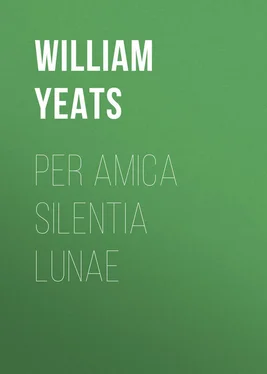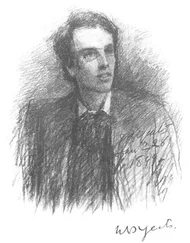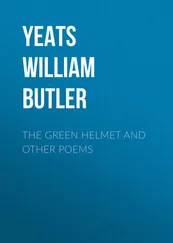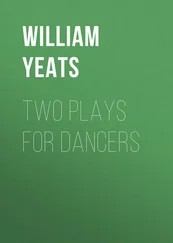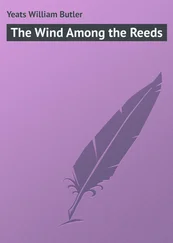William Yeats - Per Amica Silentia Lunae
Здесь есть возможность читать онлайн «William Yeats - Per Amica Silentia Lunae» — ознакомительный отрывок электронной книги совершенно бесплатно, а после прочтения отрывка купить полную версию. В некоторых случаях можно слушать аудио, скачать через торрент в формате fb2 и присутствует краткое содержание. ISBN: , Жанр: foreign_prose, на английском языке. Описание произведения, (предисловие) а так же отзывы посетителей доступны на портале библиотеки ЛибКат.
- Название:Per Amica Silentia Lunae
- Автор:
- Жанр:
- Год:неизвестен
- ISBN:http://www.gutenberg.org/ebooks/33338
- Рейтинг книги:5 / 5. Голосов: 1
-
Избранное:Добавить в избранное
- Отзывы:
-
Ваша оценка:
- 100
- 1
- 2
- 3
- 4
- 5
Per Amica Silentia Lunae: краткое содержание, описание и аннотация
Предлагаем к чтению аннотацию, описание, краткое содержание или предисловие (зависит от того, что написал сам автор книги «Per Amica Silentia Lunae»). Если вы не нашли необходимую информацию о книге — напишите в комментариях, мы постараемся отыскать её.
Per Amica Silentia Lunae — читать онлайн ознакомительный отрывок
Ниже представлен текст книги, разбитый по страницам. Система сохранения места последней прочитанной страницы, позволяет с удобством читать онлайн бесплатно книгу «Per Amica Silentia Lunae», без необходимости каждый раз заново искать на чём Вы остановились. Поставьте закладку, и сможете в любой момент перейти на страницу, на которой закончили чтение.
Интервал:
Закладка:
There are indeed certain men whose art is less an opposing virtue than a compensation for some accident of health or circumstance. During the riots over the first production of the Playboy of the Western World Synge was confused, without clear thought, and was soon ill – indeed the strain of that week may perhaps have hastened his death – and he was, as is usual with gentle and silent men, scrupulously accurate in all his statements. In his art he made, to delight his ear and his mind’s eye, voluble daredevils who “go romancing through a romping lifetime … to the dawning of the Judgment Day.” At other moments this man, condemned to the life of a monk by bad health, takes an amused pleasure in “great queens … making themselves matches from the start to the end.” Indeed, in all his imagination he delights in fine physical life, in life where the moon pulls up the tide. The last act of Deirdre of the Sorrows , where his art is at its noblest, was written upon his death-bed. He was not sure of any world to come, he was leaving his betrothed and his unwritten play – “Oh, what a waste of time,” he said to me; he hated to die, and in the last speeches of Deirdre and in the middle act he accepted death and dismissed life with a gracious gesture. He gave to Deirdre the emotion that seemed to him most desirable, most difficult, most fitting, and maybe saw in those delighted seven years, now dwindling from her, the fulfilment of his own life.
When I think of any great poetical writer of the past (a realist is an historian and obscures the cleavage by the record of his eyes) I comprehend, if I know the lineaments of his life, that the work is the man’s flight from his entire horoscope, his blind struggle in the network of the stars. William Morris, a happy, busy, most irascible man, described dim colour and pensive emotion, following, beyond any man of his time, an indolent muse; while Savage Landor topped us all in calm nobility when the pen was in his hand, as in the daily violence of his passion when he had laid it down. He had in his Imaginary Conversations reminded us, as it were, that the Venus de Milo is a stone, and yet he wrote when the copies did not come from the printer as soon as he expected: “I have … had the resolution to tear in pieces all my sketches and projects and to forswear all future undertakings. I have tried to sleep away my time and pass two-thirds of the twenty-four hours in bed. I may speak of myself as a dead man.” I imagine Keats to have been born with that thirst for luxury common to many at the outsetting of the Romantic Movement, and not able, like wealthy Beckford, to slake it with beautiful and strange objects. It drove him to imaginary delights; ignorant, poor, and in poor health, and not perfectly well-bred, he knew himself driven from tangible luxury; meeting Shelley, he was resentful and suspicious because he, as Leigh Hunt recalls, “being a little too sensitive on the score of his origin, felt inclined to see in every man of birth his natural enemy.”
Some thirty years ago I read a prose allegory by Simeon Solomon, long out of print and unprocurable, and remember or seem to remember a sentence, “a hollow image of fulfilled desire.” All happy art seems to me that hollow image, but when its lineaments express also the poverty or the exasperation that set its maker to the work, we call it tragic art. Keats but gave us his dream of luxury; but while reading Dante we never long escape the conflict, partly because the verses are at moments a mirror of his history, and yet more because that history is so clear and simple that it has the quality of art. I am no Dante scholar, and I but read him in Shadwell or in Dante Rossetti, but I am always persuaded that he celebrated the most pure lady poet ever sung and the Divine Justice, not merely because death took that lady and Florence banished her singer, but because he had to struggle in his own heart with his unjust anger and his lust; while unlike those of the great poets, who are at peace with the world and at war with themselves, he fought a double war. “Always,” says Boccaccio, “both in youth and maturity he found room among his virtues for lechery”; or as Matthew Arnold preferred to change the phrase, “his conduct was exceeding irregular.” Guido Cavalcanti, as Rossetti translates him, finds “too much baseness” in his friend:
“And still thy speech of me, heartfelt and kind,
Hath made me treasure up thy poetry;
But now I dare not, for thy abject life,
Make manifest that I approve thy rhymes.”
And when Dante meets Beatrice in Eden, does she not reproach him because, when she had taken her presence away, he followed in spite of warning dreams, false images, and now, to save him in his own despite, she has “visited … the Portals of the Dead,” and chosen Virgil for his courier? While Gino da Pistoia complains that in his Commedia his “lovely heresies … beat the right down and let the wrong go free”:
“Therefore his vain decrees, wherein he lied,
Must be like empty nutshells flung aside;
Yet through the rash false witness set to grow,
French and Italian vengeance on such pride
May fall like Anthony on Cicero.”
Dante himself sings to Giovanni Guirino “at the approach of death”;
“The King, by whose rich grave his servants be
With plenty beyond measure set to dwell,
Ordains that I my bitter wrath dispel,
And lift mine eyes to the great Consistory.”
We make out of the quarrel with others, rhetoric, but of the quarrel with ourselves, poetry. Unlike the rhetoricians, who get a confident voice from remembering the crowd they have won or may win, we sing amid our uncertainty; and, smitten even in the presence of the most high beauty by the knowledge of our solitude, our rhythm shudders. I think, too, that no fine poet, no matter how disordered his life, has ever, even in his mere life, had pleasure for his end. Johnson and Dowson, friends of my youth, were dissipated men, the one a drunkard, the other a drunkard and mad about women, and yet they had the gravity of men who had found life out and were awakening from the dream; and both, one in life and art and one in art and less in life, had a continual preoccupation with religion. Nor has any poet I have read of or heard of or met with been a sentimentalist. The other self, the anti-self or the antithetical self, as one may choose to name it, comes but to those who are no longer deceived, whose passion is reality. The sentimentalists are practical men who believe in money, in position, in a marriage bell, and whose understanding of happiness is to be so busy whether at work or at play, that all is forgotten but the momentary aim. They find their pleasure in a cup that is filled from Lethe’s wharf, and for the awakening, for the vision, for the revelation of reality, tradition offers us a different word – ecstasy. An old artist wrote to me of his wanderings by the quays of New York, and how he found there a woman nursing a sick child, and drew her story from her. She spoke, too, of other children who had died: a long tragic story. “I wanted to paint her,” he wrote, “if I denied myself any of the pain I could not believe in my own ecstasy.” We must not make a false faith by hiding from our thoughts the causes of doubt, for faith is the highest achievement of the human intellect, the only gift man can make to God, and therefore it must be offered in sincerity. Neither must we create, by hiding ugliness, a false beauty as our offering to the world. He only can create the greatest imaginable beauty who has endured all imaginable pangs, for only when we have seen and foreseen what we dread shall we be rewarded by that dazzling unforeseen wing-footed wanderer. We could not find him if he were not in some sense of our being and yet of our being but as water with fire, a noise with silence. He is of all things not impossible the most difficult, for that only which comes easily can never be a portion of our being, “Soon got, soon gone,” as the proverb says. I shall find the dark grow luminous, the void fruitful when I understand I have nothing, that the ringers in the tower have appointed for the hymen of the soul a passing bell.
Читать дальшеИнтервал:
Закладка:
Похожие книги на «Per Amica Silentia Lunae»
Представляем Вашему вниманию похожие книги на «Per Amica Silentia Lunae» списком для выбора. Мы отобрали схожую по названию и смыслу литературу в надежде предоставить читателям больше вариантов отыскать новые, интересные, ещё непрочитанные произведения.
Обсуждение, отзывы о книге «Per Amica Silentia Lunae» и просто собственные мнения читателей. Оставьте ваши комментарии, напишите, что Вы думаете о произведении, его смысле или главных героях. Укажите что конкретно понравилось, а что нет, и почему Вы так считаете.
